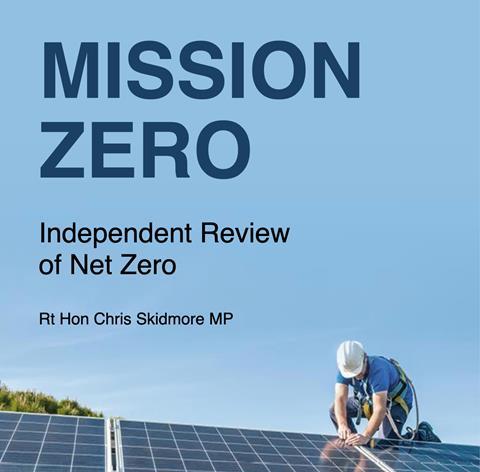
EVs need to be made more accessible to those who need them and there needs to be improvements in public charging infrastructure, including the sorting of cost discrepancies –where those without home charging have to pay a lot more to charge their vehicles. These are just two of the transport-related proposals featured in the Net Zero Review Final Report, published last week.
As expected, transport strongly featured in the Final Report, though energy-related issues generally took prominence. The linkages between energy and transport through infrastructure were identified as a crucial area of focus.
Other key transport-related proposals are for:
• Swift delivery of a zero emission vehicle (ZEV) mandate to apply from 2024, while maintaining regulations and funding to support EV/ZEV uptake and continuing to drive emission reductions from internal combustion engines;
• Government to publish the Low Carbon Fuels Strategy in 2023;
• Government to continue to work with industry to set out a clear programme by 2024 to accelerate decarbonisation of the wider freight sector through modal shift and deployment of new technologies, building on the Future of Freight Plan;
• Government to reduce delays to anticipated reforms by bringing forward the delayed Future of Transport Bill to this Parliament;
• Measures to encourage the choice of active travel or public transport, or using shared services;
• Government to adopt a public engagement strategy to communicate to people the need to reduce car journeys and about the benefits of doing this;
• Government to amend the regulatory framework to incentivise transport providers to increase demand and improve services, and to work with them on this vision, by 2024;
• Government to act to reduce the costs of public transport;
• Enabling the provision of long-term finance, required for initiatives to decarbonise the existing transport fleet;
• Measures to enable intermodality so people can more easily take different modes of transport to complete a journey;
• Developing a decarbonisation strategy for Non-Road Mobile Machinery (NRMM) by the end of 2023.
Describing Net Zero as the economic opportunity of the 21st century, review chair, Chris Skidmore MP, said that the UK has “reached a tipping point” and that the “risks of ‘not zero’ are now greater than the associated risks of taking decisive action on Net Zero now”.
The 340-page ‘Mission Zero’ report, commissioned by the government last autumn, makes 129 recommendations designed to maximise economic investment, opportunities and jobs while working towards achieving legally binding targets to reach Net Zero carbon emissions by 2050.
Zemo Partnership hosted one of the 50-plus roundtable workshops to inform the Net Zero Review which also received over 1,800 submissions.
The Zemo Partnership said the over-riding message of the report is that the UK’s future growth is dependent on rapidly embracing the opportunities afforded by the Net Zero target. However, policy needs to be more consistent, joined-up and dynamic. The UK risks “falling behind” on some targets and needs a “new approach”, the report says.
Among specific recommendations, the report calls for the development of a cross-sectoral infrastructure strategy by 2025 encompassing electricity, hydrogen, other liquid and gaseous fuels and CO2 networks that support the UK’s green economy. The report says that the “scale of this challenge, and its breadth, is too much to be left to the whims of individual projects”.
The Review comments on the number of respondents frustrated by a lack of long-term thinking and ‘siloed’ behaviour from government departments, and uncertainty over the length of funding commitments suggesting this is holding back deployment of green technologies, hampering investment across all sectors and inhibiting the ability to create British jobs.
To unlock this, the Review recommends an over-arching government financing strategy by the end of 2023, giving long-term clarity to business and investors and ensuring the UK capitalises on its industrial strengths; a long-term approach to Net Zero projects and consideration of longer-term funding certainty for major priorities for Net Zero; an Office for Net Zero Delivery, responsible for placing Net Zero delivery at the heart of government thinking, ensuring best practice for key delivery projects and taking ownership of Net Zero priorities where they span multiple departments
The report also calls for a ramping up of public information about Net Zero and for greater engagement with the public around the issue.
Zemo Partnership’s chief executive, Andy Eastlake said: “I am glad that Zemo was able to play a part in supporting this important report which clearly shows that the UK’s economic prospects are directly tied to achieving Net Zero by 2050 and that – as seen in the Transport Decarbonisation Plan – government needs to set clear, robust and consistent policies and rapidly implement them if we are to reap the full benefits from this transition.
“The report makes clear that working in partnership across sectors and well beyond existing silos will be required…it also highlights that the public need to be properly informed so we can move forward together on this journey; both areas in which Zemo has specialised and focused efforts and resources over the last 20 years.
“The Net Zero Review shows that we are heading in the right direction but also that we urgently need to step up the pace as well as bring everyone along with us.”

































1 Readers' comment